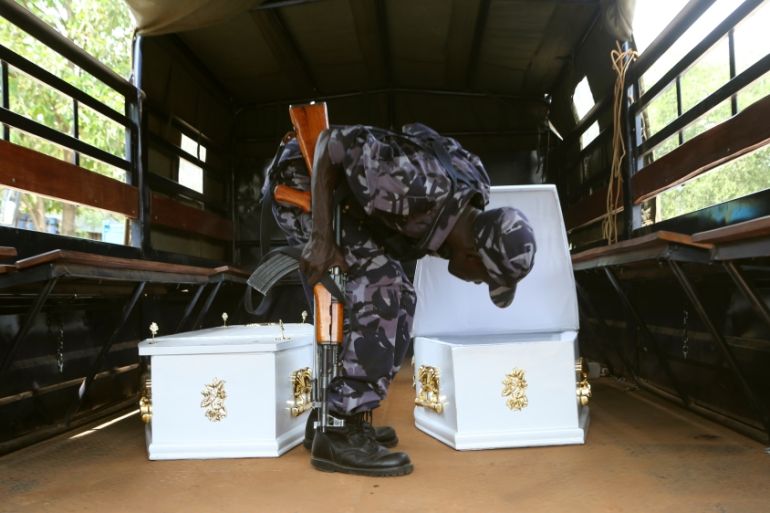Two years on, Uganda activists seek justice for Kasese killings
Kampala urged to established independent inquiry into the killing of 103 people in the western town two years ago.

Human rights activists in Uganda have called for the establishment of an independent inquiry into the killing of scores of people by the country’s security forces in a western town two years ago.
On November 26 and 27, 2016, security forces killed 103 people after storming the palace of King Charles Wesley Mumbere, a tribal leader of the Bakonzo people, in Kasese, home of the Rwenzururu kingdom.
Keep reading
list of 4 itemsBurkina Faso says HRW massacre accusations ‘baseless’
Iraq criminalises same-sex relationships with maximum 15 years in prison
The Abu Ghraib abuse scandal 20 years on: What redress for victims?
At least 15 children were among the dead, according to Human Rights Watch.
“There has been no accountability for what happened,” Oryem Nyeko, Uganda researcher for the Africa division of HRW, told Al Jazeera on Monday.
“There is no reason for the government to prevent an independent inquiry,” Nyeko said. “The government argues that it does not want to interfere with an ongoing legal process. We are calling for accountability for what happened.”
‘Climate of fear’
After initially saying that 62 people had died in the assault, the government acknowledged in March 2017 that the death toll stood at 103.
Mumbere was detained along with dozens of his guard in the raid, while the palace was torched.
The king and some of the guards have since been charged with treason, murder, terrorism and other offences. They deny the charges and have been freed on bail.
Before the deadly police raid, there had been unrest in the Rwenzururu region following a disputed presidential election in February 2016.
The vote won by veteran President Yoweri Museveni who has ruled the east African country since 1986.
The opposition – which finished first in the election in the region – accused the government of stoking tensions in the area and clamping down on political activity.
Both the government and army defended their actions, accusing the king of recruiting and arming local fighters.
“In Kasese, there is a climate of fear still hanging in the air,” Nyeko said.
“We have documented cases of arrest. People have been detained for allegedly having links with armed groups.
Traditional monarchy
The Rwenzururu kingdom is a traditional monarchy based near the Rwenzori mountains which straddle Uganda and the Democratic Republic of Congo (DRC). Its members are mainly the Bakonzo people, who are found in both countries.
The monarchy started out as a separatist movement of the same name when the Bakonzo declared their own kingdom in 1962.
This was followed by years of bloodshed until a settlement was reached in 1982 in which the movement laid down arms in return for a degree of local autonomy.
Museveni officially recognised the kingdom in 2009.
However, unrest has continued to simmer in the complex ethnic and political conflict, as many in the region still feel marginalised by authorities in the distant capital of Kampala.
Some in the country, with the support of their fellow Bakonzo in the DRC, have taken up arms and are agitating for the creation of the Yiira Republic which would cover territory in Uganda and part of North Kivu in the neighbouring country.